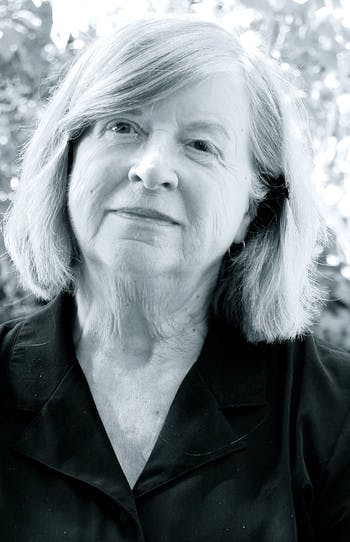Jury Citation
“Audrey Thomas’s first published short story appeared in The Atlantic in June 1965. It was called ‘If One Green Bottle,’ and its first line is ‘When fleeing, one should never look behind.’ The story was later included in her first book, Ten Green Bottles, published in the States in 1967 and republished by Oberon Press in Canada ten years later, the same year Oberon published her second book of stories, Ladies & Escorts — now there’s a Canadian title.
Audrey had moved to British Columbia in 1959, and had spent two years in Ghana (1964-66) where her then husband was teaching. As was the case with Margaret Laurence, Audrey’s early stories took place in Africa, and contained what Michael Macklem called ‘all the dominant themes of her later work: the sense of alienation in modern white society, the pervasive anxiety, the inability to feel, to fear, to love... and the power of primitive form.’ I first read them while on a grain boat on the Great Lakes, reading sentences like — ‘Rapunzel stepped down from a lorry called The Prince of Peace and moved like a dream through Accra,’ — while floating like a piece of flotsam through the Welland Canal. I developed my own theory about the work of Audrey Thomas: all her characters were trying to get to Timbuktu, but none of them ever made it. As the intrepid Canadian Nora says in her 1981 story ‘Timbuktu’: ‘It’s not so much Timbuktu I’m after, but myself.’
Audrey Thomas has also written eight novels — the first, Latakia, which takes place in Greece, appeared in 1979 and the most recent, Isobel Gunn, which has its beginning in the Scottish Orkneys, in 1999. She says she is both intensely domestic and a devoted traveller, a contradiction that has served her well. She is still fascinated by Africa: in her novel Coming Down From Wa, the main character, William Kwame MacKenzie returns from Montreal to Ghana to find out the truth about his parents — and, like Nora, about himself. And the introduction to her most recent book of stories, The Path of Totality, opens with her sitting beside a watering hole in Namibia.
She writes about pain and loss, but she also writes about joy and contentment — not the joy of finding, but the pleasure of seeking. It isn’t Timbuktu that attracts Nora, but the process of getting there, of being between here and somewhere else, of being not quite who we were and not yet who we will be. Audrey also writes about language, of course. ‘The reason I set stories in other countries,’ she has said, ‘isn’t just because I like to travel (like to be shaken up, for who are we when removed from family, friends, house, street, job, city, mother tongue?) but because it allows me to fool around with language.’
All in all Audrey has written 14 books and has received many awards. The Ethel Wilson Award three times (for Intertidal Life in 1985, The Wild Blue Yonder in 1990, and Coming Down From Wa in 1995), the Marian Engel Award in 1987, the Canada-Australia Literary Prize in 1990, the W.O. Mitchell Literary Prize in 2001 and the Canada-Scotland Literary Fellowship in 1985-86 — when she first heard stories about Isobel Gunn. We are very happy to be adding one more award to this distinguished list . We are delighted that she has not taken her own advice — for if, after her travels, she had not looked back, we would not have this extraordinary body of work — and we very much hope she will continue to fool around with language.”
— 2003 Matt Cohen Award Commitee (Patsy Aldana, Graeme Gibson, and Wayne Grady)

